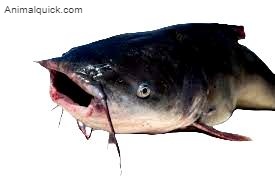Yes, catfish can eat goldfish food.
However, it is not recommended to do this more than once in a while. Both catfish and goldfish eat a mix of plants and animals.
Goldfish food has stuff like fish meal, soybean meal, wheat flour, vitamins, and minerals to keep goldfish healthy.
Catfish are not picky eaters. They eat small fish, bugs, worms, and plants.
If you want to give catfish goldfish food, do it in small amounts, and don’t make it their main food.
Catfish might do better with more protein, like live or frozen foods such as bloodworms, brine shrimp, or special catfish pellets.
Is it Safe For Catfish to Eat Goldfish Food?
Yes, it is safe for catfish to eat goldfish food.
Even though they are both fish, catfish and goldfish have different dietary needs.
Goldfish food is made for goldfish, which mostly eat plants and animals. On the other hand, catfish are more into meat.
Catfish need a lot of protein, and goldfish food might not have enough for them.
Feeding catfish the wrong food can lead to health issues like slow growth and insufficient nutrients.
To keep your catfish healthy, it’s better to use catfish food specially made for them.
This type of food has the right mix of proteins, vitamins, and minerals that catfish need.
If you have both catfish and goldfish in the same tank or pond, make sure to feed them different foods to keep them both healthy.
What Type of Fish Food Does Catfish Eat?
A catfish eats live or frozen foods, sinking pellets or tablets, crushed flakes, and fresh vegetables.
- Commercial Catfish Pellets or Sticks: Get high-quality catfish pellets or sticks with a good mix of proteins, fats, vitamins, and minerals.
- Live or Frozen Foods: Treat them with live or frozen options like worms, brine shrimp, and small crustaceans. These foods are protein-rich.
- Sinking Pellets or Tablets: Use sinking pellets or tablets that go to the bottom for catfish that feed near the substrate. These may contain fish meal and shrimp meal for a balanced diet.
- Crushed Flakes: Crushed fish flakes designed for omnivores can be suitable. Look for a mix of proteins and plant-based ingredients.
- Fresh Vegetables: Add blanched or boiled vegetables like spinach, zucchini, and peas for fiber and extra nutrients.
Do Catfish Need Special Food?
No, catfish do not need any type of special food. However, taking care of their diet is necessary.
- Protein is crucial: Catfish need a lot of protein in their diet. You can use special catfish pellets that have the right nutrients.
- Mix up their meals: While catfish can eat the special pellets, it’s good to give them different foods too. Things like worms, shrimp, and veggies (like spinach and peas) are great.
- Use sinking pellets: Catfish usually eat at the bottom, so get pellets that sink quickly. This way, the catfish can easily reach their food.
- Don’t feed too much: Giving them too much food can mess up the water. Follow the recommended amount and watch how your catfish acts and looks.
- Know your catfish: Different types of catfish might like different things. Some prefer plants, while others like meat. Learn about your catfish and what they need.
- Buy good food: Get quality food from good brands. Cheaper options might not have all the important stuff your catfish needs.
What Can I Feed My Catfish If I Run Out of Food?
If you run out of catfish food, you can feed your catfish insects, protein-rich human foods, and fish flakes.
- Fish Flakes or Pellets for Other Fish: If you have fish flakes or pellets for other fish, they can work for catfish too. Many fish foods have the right nutrients, even if they aren’t specifically for catfish.
- Live or Frozen Foods: Try live or frozen foods like worms, brine shrimp, or daphnia. These are good sources of protein for your catfish.
- Fresh Vegetables: Catfish can eat certain veggies. Offer them blanched or boiled vegetables like spinach, zucchini, peas, or cucumber for extra nutrients.
- Protein-Rich Human Foods: Give small amounts of cooked, plain meats like shrimp or fish in emergencies. Just make sure there are no additives or seasonings.
- Insects: Insects like crickets or mealworms can be another protein source. Check they’re from a safe source without pesticides.
How Many Times Should Catfish Be Fed in a Day?
The number of times you should feed catfish in a day depends on several factors, including age, size, water temperature, and feeding method.
The age and size of the catfish:
- Fingerlings (3-4 grams): 2-3 times daily
- Post-fingerlings (4-6 grams): 1-2 times daily
- Juveniles (6-10 grams): 1-2 times daily
- Post-juveniles (10 grams and above): 1-2 times daily
- Adults (400g and above): 1-3 times daily (depending on water temperature and growth rate)
Water temperature:
- Warm weather (above 26°C): 2 times daily
- Moderate weather (22-26°C): 1 time daily
- Cool-weather (below 20°C): Alternate-day feeding
- Winter (below 12°C): Optional feeding for adults (1% of body weight)
Feeding method:
- Hand-feeding: More flexibility to adjust frequency based on fish activity and appetite
- Automatic feeders: Consistent feeding schedule, may need adjustments based on water temperature and fish growth
Also, read:
- Can Catfish Live With Goldfish?
- Do Catfish Have Teeth?
- What Do Catfish Eat?
- Can Catfish Live Without Air Pump?
- Why Are Blue Catfish a Problem?
Source:
FAQs
Can catfish eat goldfish food in a pond?
Catfish can consume goldfish food in a pond, but it’s recommended to supplement with specialized catfish food to ensure they receive the necessary nutrients for optimal health.
Can catfish eat goldfish food in a bowl?
Yes, catfish can eat goldfish food in a bowl, but it’s essential to choose food with the right nutritional balance, as catfish have specific dietary requirements.
What is the primary difference between catfish and goldfish food?
Catfish and goldfish have different nutritional requirements. Catfish food typically contains higher protein levels suitable for carnivorous diets, while goldfish food often caters to the omnivorous nature of goldfish.
Is it safe to feed catfish exclusively with goldfish food?
It is not recommended to feed catfish exclusively with goldfish food. Catfish need a diet rich in proteins and other nutrients that may not be adequately provided by standard goldfish food.
Can catfish benefit from the nutritional content of goldfish flakes or pellets?
Catfish can consume goldfish flakes or pellets, but it’s advisable to supplement their diet with specific catfish food to ensure they receive all essential nutrients.
What should I look for in catfish food to ensure it meets their nutritional requirements?
Look for catfish-specific food with high protein content, essential vitamins, and minerals. Balanced nutrition is crucial for the overall health of catfish.
Can catfish eat live or frozen food like goldfish do?
Yes, catfish can consume live or frozen food. Many catfish species are carnivorous and benefit from a varied diet that includes live or frozen options such as worms, shrimp, or small fish.
Are there any specific feeding guidelines for catfish when using goldfish food?
Follow the recommended feeding guidelines on the goldfish food packaging, but consider supplementing with specialized catfish food to ensure a well-rounded diet.
Can goldfish eat catfish food if needed?
While goldfish can nibble on catfish food occasionally, it may not provide them with the ideal balance of nutrients. It’s preferable to feed goldfish food designed for their specific dietary needs.
Should I consider the size of the goldfish food pellets when feeding catfish?
Yes, consider the size of the pellets to ensure they are appropriate for the size of the catfish. Smaller catfish may struggle with large pellets, so choose accordingly.
Can improper feeding affect the health of catfish and goldfish?
Yes, improper feeding can lead to nutritional deficiencies or excesses, impacting the health of both catfish and goldfish. It’s crucial to provide a well-balanced diet and monitor their health regularly.

I love animals & want to know more about different creatures & sharing their stories with everyone. From my childhood, I’ve been exploring forests & watching animals in their homes.
Now, I write about my adventures & all the amazing things I learned. My blogs are easy to understand & make you want to know more about animals. I teach about why animals are important & why we should take care of them.

